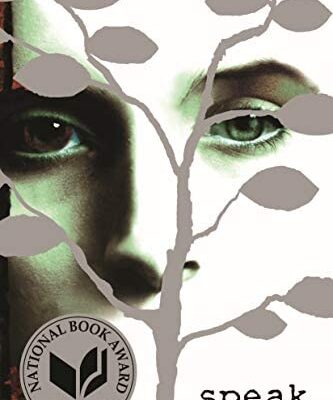Anderson’s ‘Speak’ leads readers to answers for addressing sexual trauma

“When people don’t express themselves, they die one piece at a time.”
I was sexually assaulted on Oct. 14.
Two days earlier the book club got a new book to read, Speak by Laurie Halse Anderson. Speak is a realistic YA book about a freshman girl in high school named Melinda who is struggling with trauma from being raped.
I ended up not reading the book until it was three days from being due because I didn’t want to be reminded about what happened, but as I rushed through the book I found something unexpected. I found someone to relate to. Yes, it was hard to read sometimes, but Melinda’s experiences almost exactly mirrored my own, and that’s something extremely valuable for an event as alienating as sexual assault. It’s one of the many reasons we need stories like this available to students.
Speak is one of the most banned and challenged books in American public schools because of its subject matter. According to the American Library Association, in 2020, it was the fourth most challenged and banned book in America because “it was thought to contain a political viewpoint and it was claimed to be biased against male students, and for the novel’s inclusion of rape and profanity” and Marshall Libraries said it was challenged because its ““soft-pornography,” “glorifies drinking, cursing and pre-marital sex” and “teaches principles contrary to the Bible.”
Our book club is called the BEST Book Club. BEST stands for “Books Exploring Sensitive Topics.” Senior Sarah Kreck as the leader picks two books for us to read each month with help of the school librarian Abby Hendrickson. She takes into consideration serious issues and current events that we may be able to talk about with our current English curriculum.
Kreck said, “The whole point of the book club is to explore books with sensitive topics, so I’m glad that I have the freedom to find books that students want to read and get really in-depth into the meaning of varying things like race and gender. It helps students find representation and feel seen and I don’t have to go through as many barriers as teachers. I’m glad I started the book club so I have the opportunity to help others. I don’t think it [claims of bias toward men] is unwarranted, but it’s not trying to be multiple viewpoints. It’s the viewpoint of one person who has had a traumatic event. Plus banned books really frustrate me with people trying to restrict books. I think all stories have value and all people could use it. I’m glad that our high school doesn’t have it banned so we could discuss it and have a book club on it.”
Hendrickson also emphasized on the importance of book’s like Speak. “I think the book Speak was one of the very first YA novels ever to address such a serious issue, and Laurie did this amazing job of making it very accessible, relatable and real. For students who have been through something like that to find a book that actually shows them they aren’t alone is kinda a breakthrough, and for students who haven’t been through something like that to understand rape is a real thing that happens to real kids, kids at their school, kids like Melinda. Anderson wrote this book because of something that happened to her when she was a teenager. It was her way of releasing the anger and shame she carried with her. I love the title Speak so much because it’s about making sure survivors of sexual assault remember that they have a voice — that healing will take place through being able to use that voice.”
I got my copy of the book with another member of the club, Maddie Loria. “I really enjoyed the book,” Loria said. “I wasn’t expecting to enjoy it as much as I did with its heavy topics, but I learned life lessons about when to speak out and who to speak out to. It was a really nice book. I have really enjoyed the small community we have built with the book club, and being able to read banned books is really awesome, and it’s a lot easier to talk about heavy topics with people my age or a little older. It definitely made me feel more empathetic to see a personal experience of a young girl my age. It was shocking to see what people feel and why people chose not to speak up.”
When students get to talk about sexual violence, it broadens views. It makes people who haven’t experienced it more empathic and people who have less lonely. It keeps the discussion alive of how to stop sexual violence and how to support survivors. The only thing banning a book like Speak would do is keep people ignorant, make it harder for survivors to get help without facing stigma and tell abusers that no one will stand up against them if they hurt someone. Speak encourages a conversation that saves lives.









You must be logged in to post a comment Login